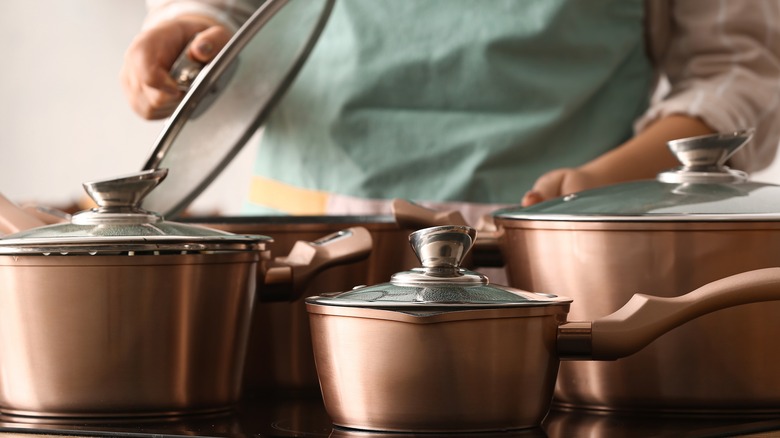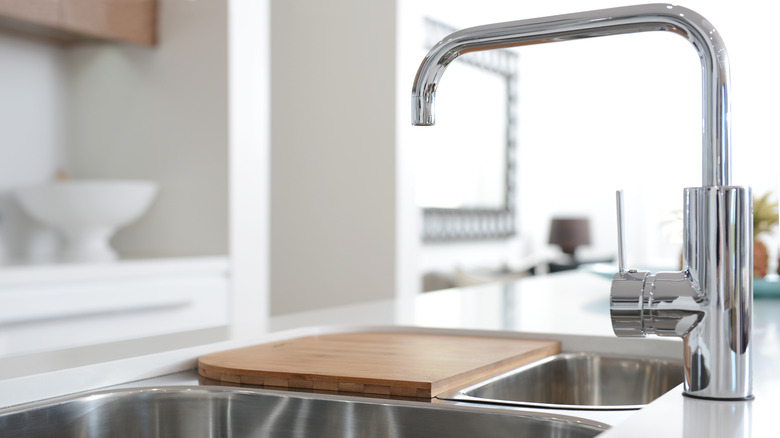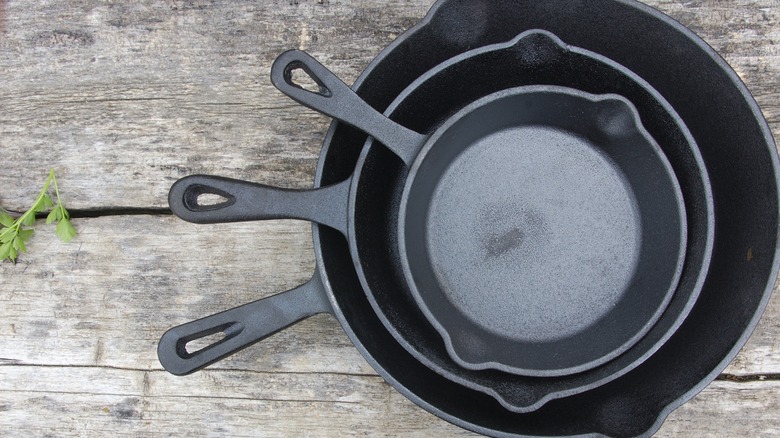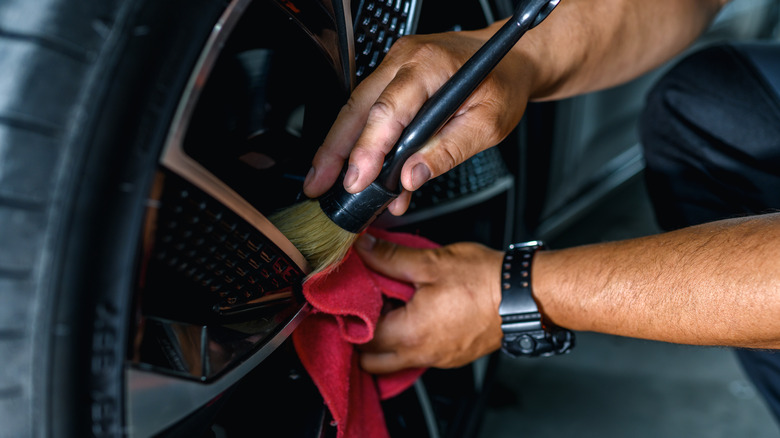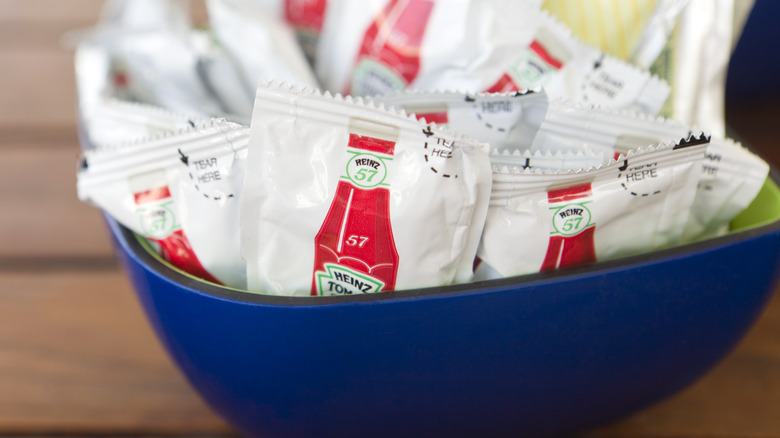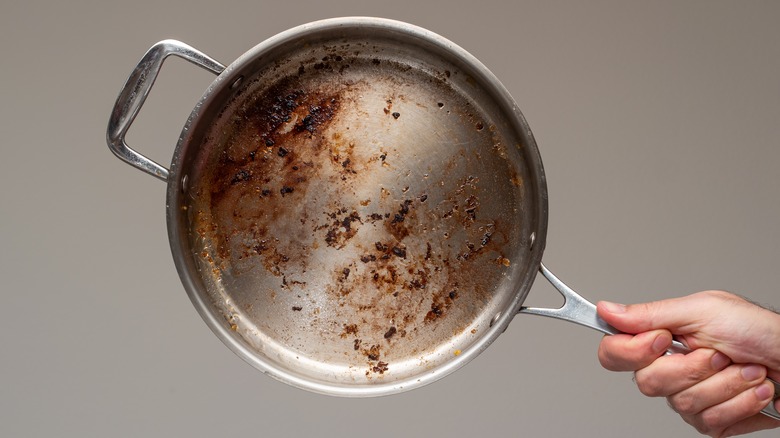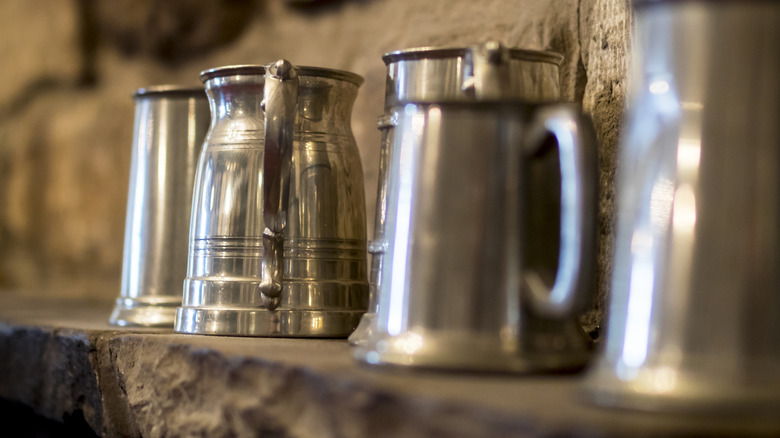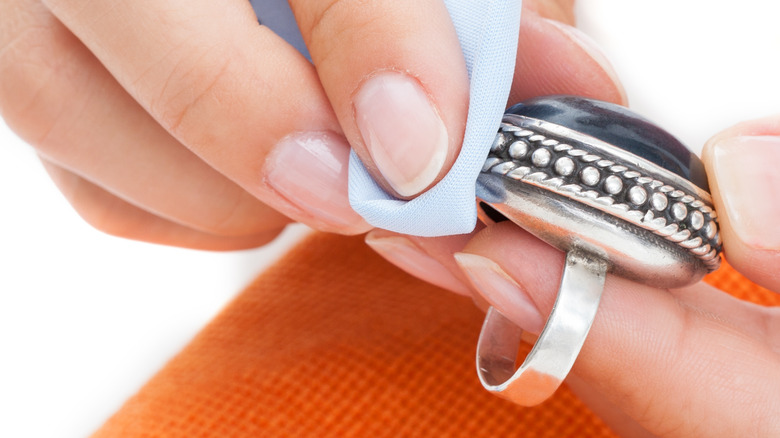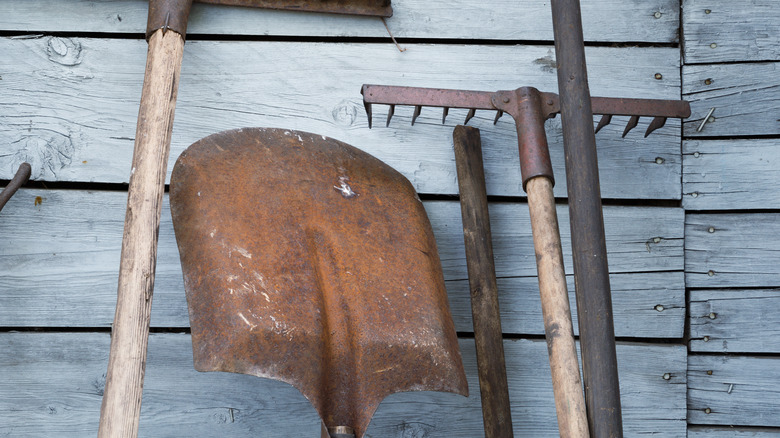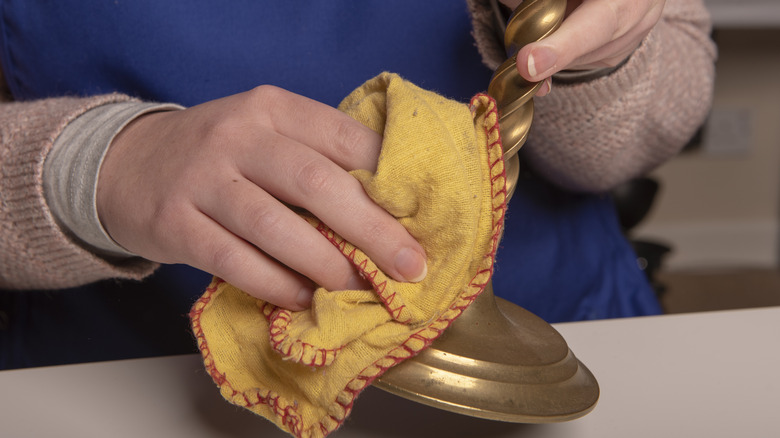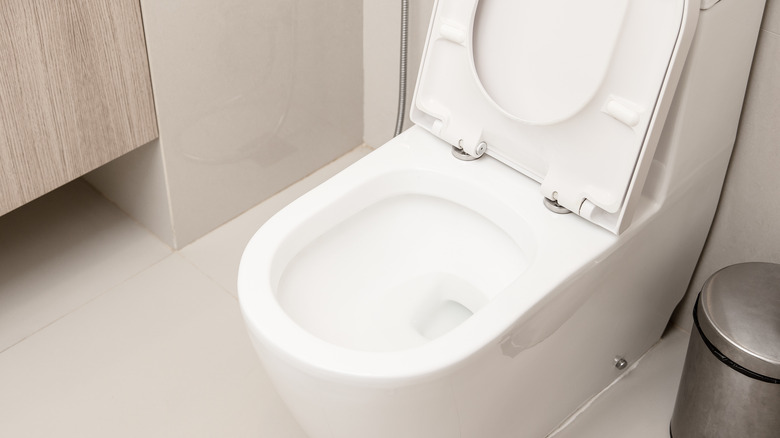All The Unexpected Ways You Could Be Using Ketchup Around The House
Ketchup dripping out of a burger or hotdog is often the culprit for spills and stains on clothing or soft furnishings, but surprisingly this common kitchen staple can actually be a stain-solving solution. Most of us have a bottle of this sweet tomato sauce hanging around in our refrigerator, so it can come in super handy as an alternative cleaning method if you run out of your usual polish or detergent and cannot wait to clean until you buy some more. Since it is also readily available and inexpensive, some of these hacks might be preferable to shelling out more money for single-use cleaners.
There are several ways you can harness the power of this popular condiment around the house, including shining up silverware and cleaning copper. It can even save the day when you suffer from a painful insect bite or your child scrapes their skin. Get your squeezy bottle at the ready and learn all about the unusual ways ketchup can be used as a home hack.
Polish oxidized copper pots and pans
Over time copper reacts with air to create a layer of copper oxide, and this is what gives your items that tarnished look. Anyone who's tried to shine up their old copper candlesticks with regular soap and water will know that the tarnish doesn't budge easily. Fortunately, copper oxide staining can be easily removed with a treatment of salt and acetic acid. Both of these ingredients are found in regular ketchup, making it a low-cost and effortless way to get your blemished items looking as good as new.
Apply a small blob of ketchup to your copper pans or baking trays and rub it in with a pastry brush, a paper towel, or a cloth. Leave the ketchup for 10 to 20 minutes, then wipe it off and rinse with warm water to reveal a clean and clear shine. If your copper is heavily tarnished you might need to combine tomato sauce with another kitchen staple for increased cleaning power. Leslie Reichert, the Green Cleaning Coach, says, "To clean and remove tarnish from copper, mix a half-cup of ketchup with two tablespoons cream of tartar. Spread on the copper and let stand for an hour. Rinse first in soapy water and then in clean water."
Clean hard water stains from your stainless steel faucets
If your kitchen and bathroom faucets are stained with soap scum or limescale, ketchup could be one of the unlikely foods you can use to actually clean your house and give your taps a mirror shine. The vinegar content in ketchup helps to melt away limescale and water stains, while the combination of salt and acid combats dried-on dirt. Domestic bathroom cleaning products typically contain chemicals, so if you're looking for a more natural way to shine your stainless steel, this could be the answer.
Apply ketchup onto your stainless steel taps, ensuring all of the surface is covered with a thin layer. While some bloggers have had luck using ketchup to clean stainless steel drains by leaving ketchup on overnight, others proved that the ketchup takes effect within minutes. Simply wipe away the ketchup and rinse with warm water before buffing with a dry cloth. This no-scrubbing hack was shared on a Facebook cleaning group, where members were shocked at how well it worked. One commented, "Whoever came up with the tomato sauce tap hack, you're a genius. Have tried everything, and nothing worked like this. No scrubbing, no effort. I'm blown away." Because vinegar is the ketchup component that does a lot of the heavy lifting, straight vinegar can also do the job.
Remove rust from your cast iron pans
Cast iron pans are the workhorses of the kitchen. They can last for decades if treated with care; however, even with the best of intentions, these cooking tools can suffer from rust. Fortunately, you can remove rust from your cast iron pan thanks to ketchup. Rust forms on cast iron equipment when it has been exposed to moisture, such as during the cleaning process, or even in a humid environment, which is common in kitchens. The iron reacts, or oxidizes, to create rust. Seasoned cast iron users know that salt scrubs and vinegar-water soaks help remove rust from your pans, so it should come as no surprise that ketchup, which contains both of those ingredients in spades, is can help save your pans by breaking down the iron oxide compounds.
If your cast iron pans are rusty, apply a liberal amount of ketchup to the surface and leave them overnight. The viscosity of the condiment allows it to stick to the pan, effectively providing a soaking treatment. The acid in the sauce will weaken the bonds between atoms in the rust, enabling it to be easily removed when wiped off the next day. Remember to rinse well with warm water, otherwise, any lingering remnants of ketchup could become burnt on the next time the pan gets used.
Shine your alloy wheels
If you'd rather not spend a small fortune getting your car detailed after it gets dirty, you could try a DIY clean with the help of this common kitchen staple. Ketchup makes for a mild cleaning agent that can give your automobile wheels a sparkling shine. The vinegar in ketchup works to remove stains that develop on car wheels thanks to the rain, and it also breaks down small rust spots and shines up metal.
Wheel cleaner can be expensive, running more than $20 a bottle, but for just a few dollars you can get a bottle of ketchup and give your wheels a glossy finish. Simply squirt the tomato sauce straight onto the wheels and scrub it in with an agitator brush. Once it's all brushed in, hose off the condiments and dry the wheels with a soft cloth to reveal a gleaming finish. If there's extra black grime caked onto your wheel, simply use a rag or paper towel and wipe it out.
Use ketchup packets in a pinch as individual ice packs
The sachets of ketchup you pick up from fast food restaurants have a way of piling up in your car glove box or kitchen drawer. You'll probably never use them on your fries, so instead, repurpose them as mini ice packs. When kept in the freezer, these small sachets will turn solid and icy and can provide instant relief for insect bites, mild burns, or grazed knees, especially if you have kids.
To make your ketchup sachets into miniature ice packs, simply pop them into the freezer and save them for the next time you need a cold, soothing sensation. They make a much less messy alternative to frozen peas or vegetables, which tend to be too bulky for small injuries like bites and can drip condensation everywhere after they've been at room temperature for too long. Too many frozen sauce sachets and no mosquito bites to tend to? It's a great problem to have! Fortunately, these mini cold compresses could also double up as cooling beauty packs for tired and puffy eyes.
Remove burnt-on food from pots and pans
You might not think adding more food to already burnt-on food could solve this common kitchen cleaning conundrum, but ketchup can actually combat cooked-on stains. The acetic acid and salt mixture in this popular addition to burgers and fries can break down burned bits on your pots and pans. Next time your casserole dish is suffering from the remnants of last night's lasagna, give your scouring pad a break and instead consider putting your ketchup to work.
Vinegar is the ingredient in tomato sauce that loosens and removes burnt-on spills, so you could just clean your pans with this acidic liquid. However, ketchup works better to cling to the stains because of its thicker consistency, so you can leave it to work and pass on the scrubbing. Apply ketchup to your burnt cookware and allow it to rest for an hour or overnight for seriously stubborn stains. The following day, rinse clean with warm water and soap and dry by hand to reveal gleaming pans. If your kitchenware has layers of burnt-on food you could use a razor blade to clean burnt baking sheets before you treat them with tomato sauce. This will remove the excess so the ketchup can get to work at the root of the issue.
Polish your pewter
Pewter is made up of a combination of metals — usually tin, antimony, and copper — and depending on the type of pewter you have, it may or may not be susceptible to tarnishing. If you want to know how to successfully clean pewter without using harsh chemicals, consider some items you probably already have around the home like baking soda, cabbage leaves, or ketchup. The acetic acid in ketchup will break down the bonds that form a tarnish on the pewter, making it a quick and easy solution for shining up old cutlery, jewelry, or decor items.
Apply ketchup to pewter with a soft cloth and gently rub it into the metal. Leave it for around 15 minutes, and then wash away with warm water and dry immediately. If there are still lingering stains you can repeat the process. Avoid leaving the ketchup to work for any longer than 30 minutes at a time, as this could cause damage to the metal. While the condiment can work in a pinch, it's still not going to be as effective as silverware polish, which is specifically designed for the job.
Make silver jewelry shine
Silver jewelry is rarely pure silver. It is mixed with other alloys which makes the metal vulnerable to tarnishing. Interestingly, you can clean silver with ketchup as a more gentle alternative to commercial silver-cleaning products. The acidity of the tomato and vinegar in this popular red sauce is gentle enough to be safe to use on your most precious treasures, yet strong enough to break down the tarnish. Before you spend the big bucks on specialist jewelry cleaning products, give this low-cost, eco-friendly option a try.
Use a soft-bristled brush to gently scrub ketchup into your silverware and leave it to sit for a few minutes. Avoid allowing the ketchup to work for any longer than half an hour as this could damage the surface of the silver. Wash the condiment off thoroughly with warm water to reveal a sleek and shiny finish. For heavily tarnished items you may need to repeat this process several times. Take care to scrub gently since silver can scratch. This hack works best with sterling silver, as other silvers have a thin coating on them that the acid might harm. Some have reported issues with cleaning silver this way, so if you're going to choose a piece of jewelry for a test run, don't reach for your engagement ring first.
Remove rust from your tools
Ketchup is one of the common household essentials that can remove rust from items in your home and garden. Equipment like trowels and shovels left in a damp shed or garage will develop rust over time, but instead of throwing them away and replacing them, consider using tomato sauce to bring your tools back to their former glory. The acetic acid in ketchup targets rust to help it melt away, leaving tools looking as good as new.
If your tools need to be revived from rust, slather on a generous amount of ketchup and allow it to settle overnight. The next day, scrub the tools and then hose with water to remove both the sauce and the rust, then dry them with a cloth. It's best to do this in a garage, where insects are unlikely to make a move on your ketchup-coated tools.
Breathe new life into brass
Brass can become dull with heavy use or the passing of time, but there's no need to buy expensive brass polishers to get your shine back. Ketchup can work wonders on brass to achieve a mirror shine with just a quick polish. The vinegar content of ketchup is the magic ingredient in this instance, removing any tarnish and leaving behind a high-gloss finish with no smears.
Any brass item that needs a little TLC can be treated with ketchup. Brass musical instruments, door handles, light fittings, candlesticks, pans, and cutlery can all benefit from a dab of this sweet sauce. Squeeze a generous amount of ketchup onto the brass and work it in with a damp cloth with circular motions. Once it's properly coated, let it sit for a minute before washing it clean and drying it by hand. If you have intricate or ornate brass objects you can work the ketchup into the metal using an old toothbrush.
Clean your toilet bowl
Surprisingly, ketchup can clean your toilet in a pinch. The vinegar in ketchup allows this tomato sauce to help remove stains and watermarks in your toilet bowl, making it a safe and cheap alternative to bleach and commercial cleaners. According to the National Sanitation Foundation (NSF), "Vinegar is about five percent acetic acid, which helps it break down the structure of some dirt, oils, films, stains and bacteria."
Clean your toilet with this kitchen staple by squeezing it directly onto the sides of a stained bowl. Use a toilet brush to scrub in the ketchup and then leave it for at least an hour. Use your toilet brush again to loosen up the red sauce and give the toilet a flush. This will carry away the ketchup and any stains or debris from inside the toilet walls, leaving them sparkling and clean. Make sure you don't have any ketchup remaining on your toilet brush. And while it's fine for occasional use, a product designed for toilet bowls is the best option for routine cleaning.

